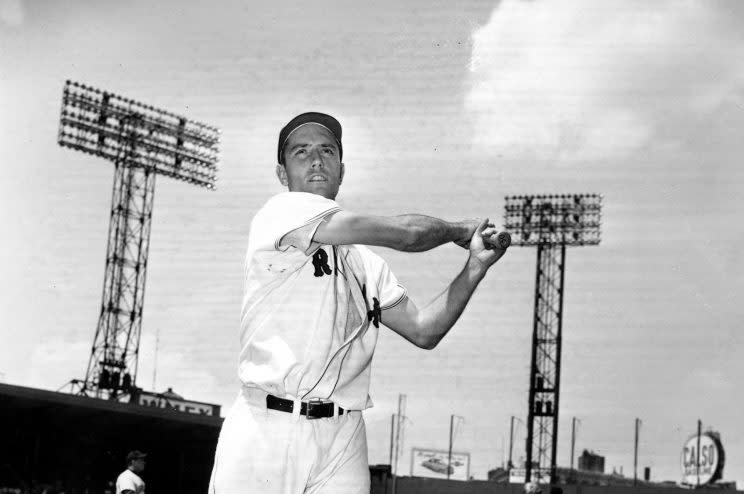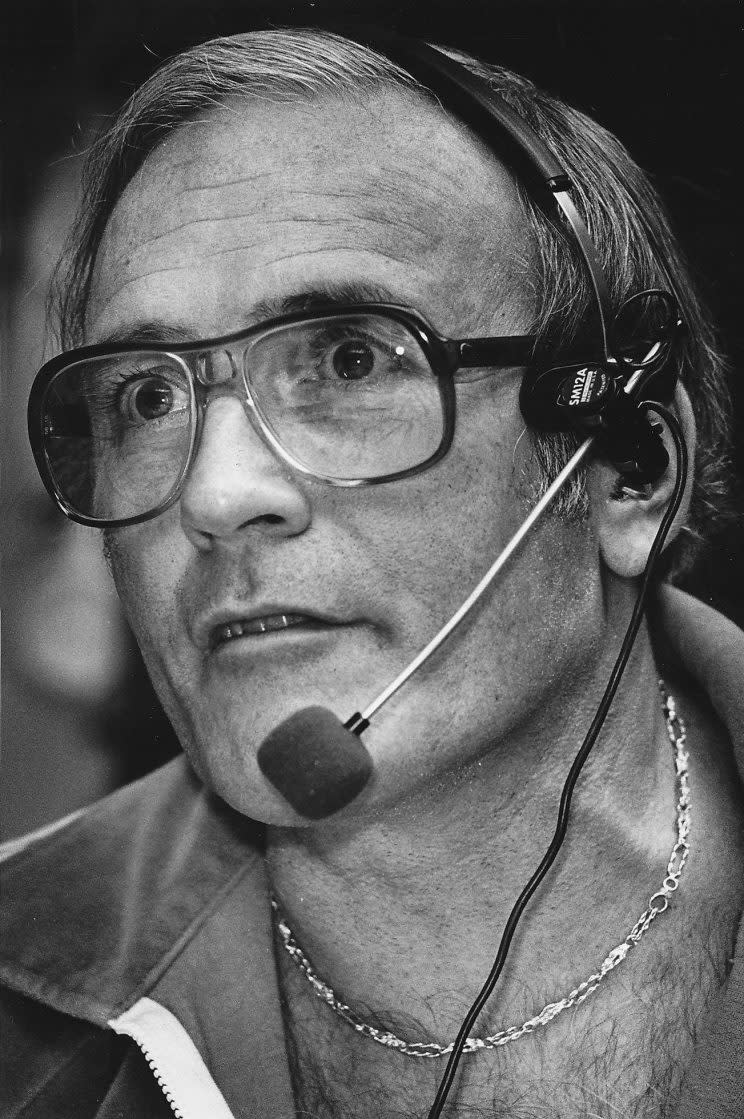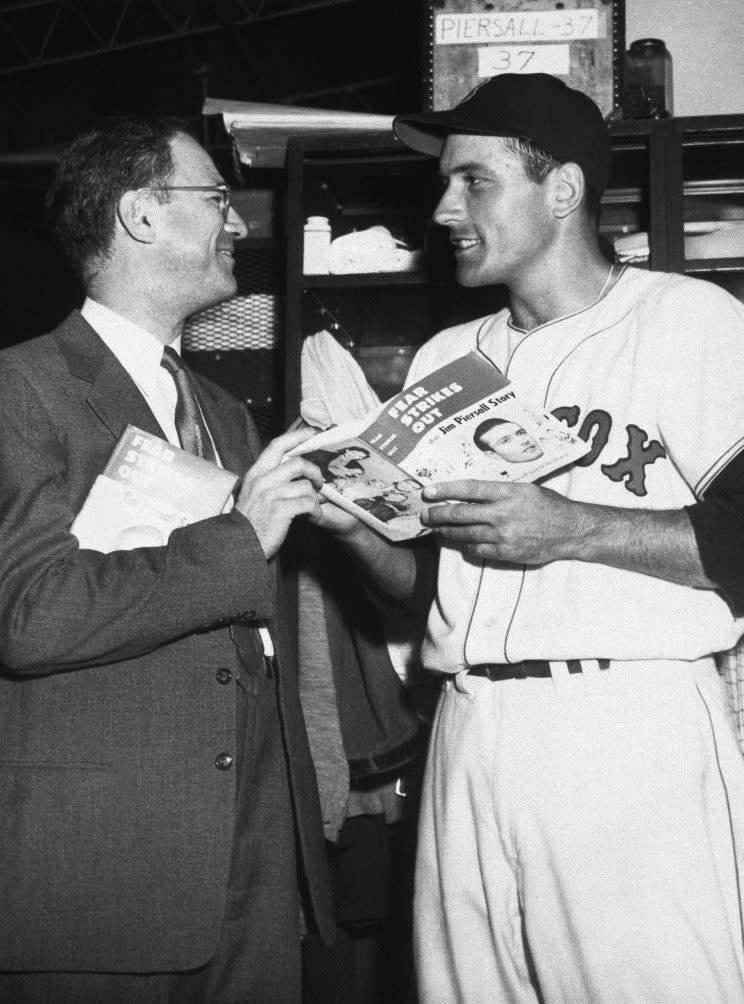Jimmy Piersall, former MLB player and mental-health pioneer,' dead at 87

Jimmy Piersall, the former MLB player, broadcaster, instructor, and mental-health pioneer, died on Saturday at 87.
Piersall was a gifted defensive outfielder who played for five teams between 1950 and 1967, but he’s most remembered for his character. Imagine a baseball player today celebrating his 100th home run by running the bases backward. It sounds insane, right? But that’s what Jimmy Piersall did in 1963.
[Fantasy Football is open! Sign up now]
During his rookie season with the Boston Red Sox in 1952, Piersall exchanged punches with Yankees player Billy Martin before a game, and then fought with his own Red Sox teammates. A few weeks after his fight with Martin, Piersall made pig noises at Satchel Paige, who was pitching for the St. Louis Browns.
Piersall’s antics became famous (or infamous) in baseball, but they were symptoms of a greater problem: bipolar disorder, then called manic depression. There was more strange behavior after the pig noise incident, which led to his demotion in the middle of his rookie season. His odd behavior was part of an ongoing nervous breakdown, and several weeks after his demotion he checked himself into Westborough State Hospital. He stayed for six weeks and underwent counseling and shock treatment.
In 1955, 12 years before his playing career would end and three years after his breakdown, Piersall wrote and published the book “Fear Strikes Out” with Al Hirshberg, which described his recent (and continuing) battle with mental illness. It was an important book because mental illness wasn’t publicly discussed at the time, and it was unheard of for a baseball player to readily admit he was suffering from mental problems. Piersall was a true pioneer who helped reduce the stigma for others suffering just like he was. From the New York Times:
“Mr. Piersall’s courageous description of his struggles with manic depression, now called bipolar disorder, helped bring the disease and its treatments out of the shadows,” Dr. Barron H. Lerner, professor of medicine and population health at the New York University Langone Medical Center, wrote in The New York Times in 2015. “It was really a big deal 60 years ago.”
The book was turned into a movie with the same name, and Piersall was portrayed by “Psycho” star Anthony Perkins. Piersall wasn’t a fan of the movie, which dramatized the book and included events that never happened. (He also thought Perkins looked ridiculous trying to play baseball.)

Piersall’s career on the field led to a career in the broadcasting booth, where he teamed up with a pre-Chicago Cubs Harry Caray to call Chicago White Sox games. The two called games together from 1977-1981, a span that included some pretty bad White Sox teams. And neither of them tried to hide it. Here’s how Paul Sullivan of the Chicago Tribune described their “act.”
Their act was so unusual it was almost Vaudevillian, never to be replicated. Caray would often ask “Did you take your pills today?” — poking fun at Piersall’s crazy reputation and taking the focus off the bad baseball we were forced to watch.
They weren’t shy about criticizing the team and its coaching staff, which led to a feud between Piersall, young White Sox manager Tony La Russa, and third base coach Jim Leyland. (Leyland even tried to fight Piersall during one confrontation.) But Piersall kept right on being himself. He called baseball wives “horny broads” on a 1981 broadcast and somehow wasn’t fired, though he did serve a suspension. After the 1981 season, Caray defected to the Cubs and the team of Hawk Harrelson and Don Drysdale started calling Sox games.
Piersall’s honesty was both a strength and a weakness. Fans loved him for it, but his opinions got him in trouble — and not just with LaRussa and Leyland (and scores of baseball wives). When Cubs manager Jim Riggleman was fired in 1999, Piersall went on a local radio station and said that team executives Andy MacPhail and Ed Lynch should have been fired instead. Piersall was a minor-league instructor for the Cubs at the time, but not for much longer: he was fired as a result of his comments.

Piersall’s greatest legacy is his willingness to publicly discuss his battle with mental illness. He wrote “Fear Strikes Out” 62 years ago, a time when shock therapy was still widely used to treat mental illness. The stigma of mental illness isn’t as great as it once was, but it’s still difficult for baseball players to be open about their struggles. But if Piersall was afraid to talk about it, he never showed it. Here’s a short passage from his book, provided by the Boston Herald.
“I want the world to know that people like me who have returned from the half-world of mental oblivion are not forever contaminated,” Piersall wrote. “We have been sick. The best way to help us get well and stay well is to treat us like human beings — as I’ve been treated. We don’t have to talk about our sickness in whispers or prowl about on the edge of society with our hands to our ears to block out the whispers of others. We have nothing to be ashamed of. All we want is to be understood by those who have never been where we have. There is no better therapy than understanding.”
If there’s an argument for making “Fear Strikes Out” required reading for every baseball player, Piersall made it in that single eloquent statement, which is just as relevant today as it was in 1955.
More MLB coverage from Yahoo Sports:
– – – – – –
Liz Roscher is a writer for Big League Stew on Yahoo Sports. Have a tip? Email her at lizroscher@yahoo.com or follow her on twitter! Follow @lizroscher


